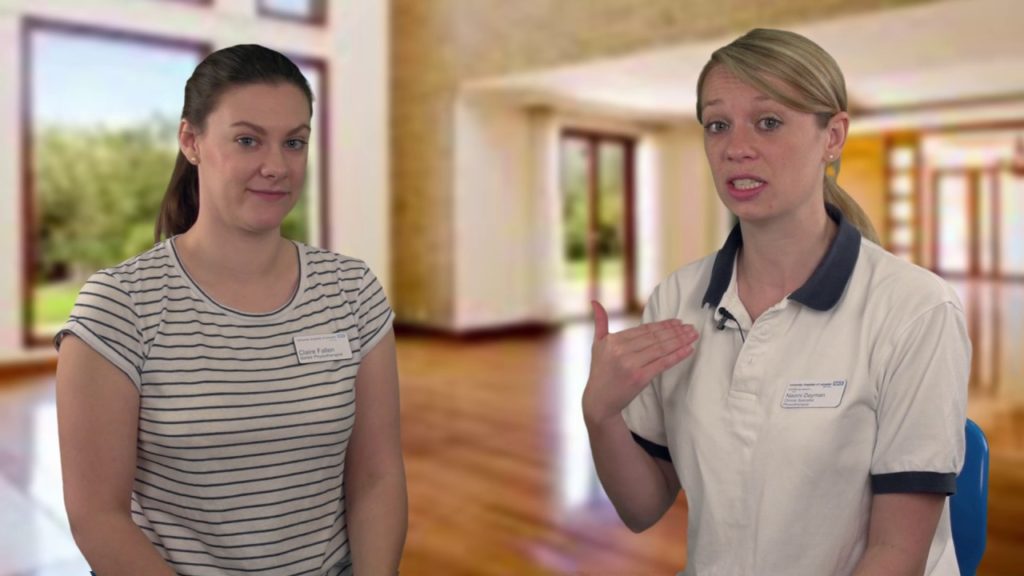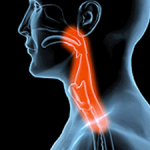The Children’s Cystic Fibrosis team at Leicester’s Hospitals have created a series of short videos on YouTube to help provide advice, information and tips to parents and carers looking after children who suffer from Cystic Fibrosis.
Naomi Dayman, Clinical Specialist Physiotherapist, and Claire Fallen, Senior Physiotherapist, came up with the idea to produce short informational films so that those looking after children with Cystic Fibrosis could check they were using equipment in the right way and using the proper techniques.
Naomi explains further: “The Children’s Cystic Fibrosis Team at the Leicester Royal Infirmary are responsible for delivering a new diagnosis of Cystic Fibrosis to patients across Leicestershire and North Northamptonshire and managing their care needs. It is an overwhelming experience for these families due to the extensive therapies that are required to keep their children as healthy as possible. Meeting each health professional and taking on board the regimes that their child requires can be an overload of information and generate many questions that often arise outside of their clinic appointments.”
Claire added: “It was clear to me that we could help families to process and understand the importance of completing airway clearance techniques including how to use and maintain their equipment. These videos provide quick and easy access to information that may not have been fully understood in the clinic environment.” For example, the team often received questions about how to use Baby PEP (positive expiratory pressure) – the method of using a small piece of equipment used to help check a child’s airway clearance. One of the short films runs through a simple demonstration of the equipment.
One family that use the Children’s Cystic Fibrosis Service are the Jefferys. Jack and Sophie’s second little boy, Stanley-Ray, was diagnosed with Cystic Fibrosis at 20 days old. Leicester’s Hospitals have been part of their journey as Jack explains: “The support from the hospital has been fantastic, they are always on hand to answer any questions we have, nothing is too much trouble and they make time for whatever needs we have. the team don’t just treat the patient, they also get to know the family, which helps a lot especially in the first year when everything is new and appointments are more regular.”
Videos:
The Children’s Cystic Fibrosis team wanted to receive some feedback from families that use the service and Jack and Sophie kindly volunteered. Jack and Sophie have seen all the videos online, saying: “The videos are great, it’s good that there is now something like this that is readily available for new parents to see, your given so much information at first and it can be quite daunting so it definitely helps being able to see things for yourself. We would also like to say thank you to all the team help in different ways and all deserve special recognition in the areas they cover and the amazing jobs they do. As we’ve said they go beyond the call of duty.”
Consultant Erol Gaillard believes that the videos will be extremely helpful: “Regular daily chest physiotherapy is an absolutely essential part in the management of children and adults with cystic fibrosis. There are a number of available physiotherapy devices working in slightly different ways. Despite regular reminder sessions in clinic the videos produced by our children’s physios Naomi and Claire are a fantastic resource for patients and parents. The videos describe in good detail the function of the device and the breathing technique required to get the most out of the physiotherapy devices. In addition there is information on cleaning and maintenance of the equipment.
“These videos are a brilliant way for patients and parents to review their technique in their own time, to remind themselves of the best way to use them and to clarify questions they may have but did not feel confident to ask.”
Get it off your chest CF Blog:
Jack and Sophie decided to start a blog not long after the diagnosis, not only as a diary for Stanley (who will be 1 on 22 July) but also to raise awareness of the condition and for other parents with a newly diagnosed child to be able to look online and see something positive. The majority of blogs on the internet are by CF sufferers themselves in their late teens rather than parents straight from diagnosis and focus on adapting to life with CF or the feelings and thought processes that hit you.
Sophie added: “Cystic fibrosis has now become a part of our lives; treatments have become part of our normal daily routine – having a routine is definitely the key! It allows us to still do all the things we would have done before. We are still learning about CF all the time, things have now settled down from those first few months and everything isn’t as daunting as it once was. When you’re first given the diagnosis it’s hard to imagine how anything can be ‘normal’ again, but it’s possible. You change and adapt, there are so many new treatments coming up allowing people with CF to lead longer and happy lives, we are positive about what the future holds.”
One thing they have learned is CF is unpredictable. One minute you can be eating dinner and the next on the way to the hospital, things can really change that quickly! Routine, preparation and forward planning are the main things, daily routines, preparing medicines, day packs and ensuring things Stanley encounters are as germ free as possible. Forward planning: family parties and making sure we know about the runny noses or colds lingering around!
When they started the blog the main aim was to spread the word of Cystic Fibrosis and to offer a helping hand. Jack explains further: “I felt I wanted to do something big for charity to help get the word out there but also in a way as a coping mechanism in the early months following diagnosis, as a kind of focus. The CF Trust are the charity who we are primarily raising money for but we also want to help CF Team at Leicester Royal Infirmary also, as a token of our appreciation and to ensure they can keep on doing the amazing job they do.
“The London to Paris bike ride was the first big charity event I came across – it involved six months of training and the bike ride itself was more than 300 miles over four days on just two wheels. No amount of training could have prepared us for the bike ride looking back now, the sheer height of the hills and valleys were one hell of a challenge but our goal got us through to the finish line – raising awareness for Cystic Fibrosis. We want to go even bigger than the bike ride in the future – climb mountains, trek deserts (The North Pole has even cropped up as an idea!) and ultimately organise our very own charity challenge in the years to come.”

